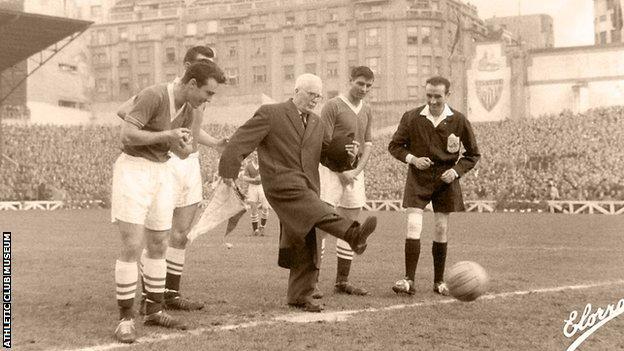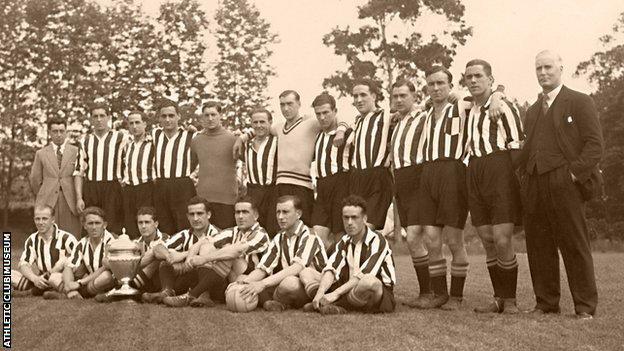Fred Pentland: Athletic Bilbao's English coach who changed the face of Spanish football
Last updated on .From the section European Football

It may be 100 years since he first set foot in the city, but mention the name Fred Pentland and Athletic Bilbao fans will fondly recall the legend of the Englishman with a trademark bowler hat and cigar.
'El Bombin' wasn't the first English coach to lead the Basque club but he did leave an unprecedented mark on their history and can also claim to have played a key role in the evolution of Spanish football.
In his first spell with Athletic, Pentland guided his side to the 1923 Copa del Rey; on his return he won the competition four times in a row - from 1930 to 1933 - added two La Liga titles and also presided over a 12-1 drubbing of Barcelona, the Catalan club's heaviest defeat.
His side played a pioneering brand of attacking, possession-based football, a philosophy that would soon be adopted by other leading teams in Spain and still survives today.
"Fred Pentland is one of those people who has survived the passing of time," explains Athletic's museum director Asier Arrate.

Born in Wolverhampton, Pentland was an outside right who became an England international and had his most notable club spells with Blackburn and Middlesbrough, before moving into coaching with the German Olympic team in 1914.
At the outbreak of World War One he was interned at a camp near Berlin, organising football tournaments between the prisoners, before going on to coach Strasbourg, and then France at the 1920 Olympics.
His first foray into Spanish football was with Racing Santander, but Pentland's burgeoning reputation as a manager led Athletic to pounce in 1922.
"Athletic made him a very good offer," says Arrate. "They wanted to invest in a good coach. It was a very amateur type club, so we were looking for a prestigious coach.
"He made a lot of discipline related to the training and established a foundation to make it a more organised, professional sport."
Pentland was a stickler for fine details, with the story going that during his first training session he taught his players how to tie their laces properly, but he was also well liked by the squad and his colleagues.
"After the human experience of dealing with the war and all different people, when he came here to Bilbao he had this humane touch," adds Arrate.
"He had an interesting personality, was very optimistic and intelligent. Within a few months he was writing in the sports magazines about how teams should play."
Pentland encouraged his players to veer away from the direct approach common at the time to instead adopt his principles of a passing game that has led to some comparisons with Pep Guardiola's Barcelona.
"The typical formation was 2-3-5, with five strikers," says Gaizka Atxa, president of the Mr Pentland Club, a London-based Athletic Bilbao supporters' group.
"Mr Pentland changed that to having more people in midfield and he would value possession more than the rivals, playing a short game - I don't know if you could call it similar to what Barca implemented 10-20 years ago with tiki-taka.
"He definitely helped us believe in what we were doing as a club and it cemented success and that winning mentality. That is the most important thing he cultivated."

He also played a vital role in introducing a more professional approach at a time when most clubs in the country were amateur, telling board members to strive to pay players if they really wanted to compete.
Pentland left the club in 1925 and twice coached Atletico Madrid, either side of a spell at Oviedo, and was also part of Spain's management team when they became the first country outside the British Isles to beat England, winning 4-3 in 1929.
Later that year, he returned to Bilbao to herald the most fruitful spell in Athletic's history, and one that cost him a lot of bowler hats - with legend saying the eccentric coach's players would jump up and down on it after each victory.
"People here understand Athletic became a great team since its inception because of the British influence," says Atxa. "There are very strong links and economic ties, the industrial revolution, mining, ship building. It is a port city.
"Mr Pentland was the stereotypical English gentleman with the bowler hat and the umbrella and the cigar. Everybody tells you he was a very warm character, very sociable. You would see him in the street and he would say hello to fans - he was very approachable.
"He clicked with the people here because we like to have a good time. We like to eat, we like to drink, and I think he found his Zen."
Pentland left after the the fourth successive Copa del Rey win in 1933 and the side he built went on to win the Spanish title in 1934 and 1936, the same year he returned to England and civil war broke out in Spain.
"You hear his name on the street and everybody knows it is a man with a bowler hat and a cigar," says Atxa, who counts members of Pentland's family among his supporters' group.
"He has maintained the status of a myth or a legend."

- Ancient Egypt's ultimate 'yummy mummy': She reigned for over 20 years but why did history try to erase her?
- Boost your memory and heart health: Find out how a nap could slash your risk of heart attack by half






















